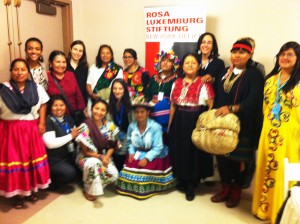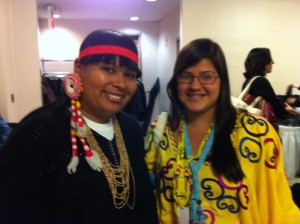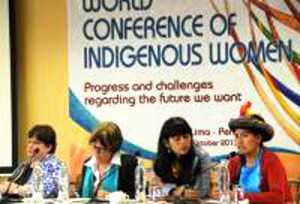Indigenous Women and the UN Millennium Development Goals: Challenges and Lessons
 One of the most moving sessions I attended at the UN Commission on the Status of Women highlighted the perspectives of indigenous women on the implementation of the UN Millennium Development Goals (MDGs). In a packed room, indigenous women from around the world and others spoke about the importance of including indigenous women in working toward these goals.
One of the most moving sessions I attended at the UN Commission on the Status of Women highlighted the perspectives of indigenous women on the implementation of the UN Millennium Development Goals (MDGs). In a packed room, indigenous women from around the world and others spoke about the importance of including indigenous women in working toward these goals.
 Sadly, indigenous women have not played a prominent role in the process of implementing these UN goals. Many people at this UN session commented that indigenous women have not been consulted: “We have been absent from the implementation of the UN Millennium Development Goals. Thus there is almost a complete lack of implementation of goals from the Beijing conference.” The indigenous women focused especially on the UN goal of ensuring environmental sustainability: “The environment has been destroyed. Mother Earth is crying out. Our land has been grabbed, and women and children displaced. The exploitation of natural resources hurts indigenous women and everyone. There is a network of indigenous youth who are studying what’s happening with our water and other natural resources. This intergenerational approach to our advocacy is very important.”
Sadly, indigenous women have not played a prominent role in the process of implementing these UN goals. Many people at this UN session commented that indigenous women have not been consulted: “We have been absent from the implementation of the UN Millennium Development Goals. Thus there is almost a complete lack of implementation of goals from the Beijing conference.” The indigenous women focused especially on the UN goal of ensuring environmental sustainability: “The environment has been destroyed. Mother Earth is crying out. Our land has been grabbed, and women and children displaced. The exploitation of natural resources hurts indigenous women and everyone. There is a network of indigenous youth who are studying what’s happening with our water and other natural resources. This intergenerational approach to our advocacy is very important.”
Another emphasis of this UN session I attended was the vulnerability of indigenous women and girls to violence partly because of the economic injustice that indigenous people suffer with high rates of unemployment and low-paying jobs. Here are some of the comments: “We must eliminate violence against indigenous women and girls. We can’t have sustainable goals if we continue to have violence against indigenous females. We’ve got to stop trafficking of indigenous girls and women. Human rights include indigenous women and all indigenous people collectively. We need a collective human rights approach. We demand an end to violence—emotional, spiritual, and physical violence. We defend our indigenous cultures and critique our cultures. We realize that our rights as women are also violated by our cultures.”
This UN session was sponsored by Rosa Luxemburg Stiftung—New York Office and MADRE. Rosa Luxemburg Stiftung is an international, progressive institution committed to the analysis of social processes and developments worldwide and collaborating with organizations around the globe on democratic and social participation, empowerment of disadvantaged groups, alternatives for economic and social development, conflict prevention, and peaceful conflict resolution. MADRE is an international women’s human rights organization that works in partnership with community-based women’s organizations worldwide to address issues of health and reproductive rights, economic development, education and other human rights; MADRE’s mission is to advance women’s human rights by meeting urgent needs in communities and building lasting solutions to the crises women face.
At this UN session I also learned about International Indigenous Women’s Forum, one of MADRE’s partners. This global network of indigenous women from Asia, Africa, and the Americas promotes the rights of indigenous women and the collective rights of indigenous peoples. International Indigenous Women’s Forum works to increase the role of indigenous women in international decision-making processes and to ensure that the perspectives of indigenous women are included in human rights discussions. This network facilitates indigenous women’s participation at regional meetings and UN conferences, advocates for indigenous women’s work, and builds alliances between the indigenous women’s movement and the global women’s movement. One woman commented on the great need for these connections because “many indigenous women are isolated, far removed from one another.”
A Nicaraguan indigenous woman voiced a common theme: “The challenge of indigenous women is to speak aloud, to share our culture and values, to contribute to the wealth of intercultural dialogue and research. We need to be global human beings, to be citizens of the world, to develop common strategies, and to share relationships.”
 This UN session celebrated the World Conference of Indigenous Women, held in Lima, Peru, October 28-30, 2013. This conference included indigenous women from seven sociocultural regions of the world, as well as UN agencies and supporters. The declaration that resulted from this conference includes these statements:
This UN session celebrated the World Conference of Indigenous Women, held in Lima, Peru, October 28-30, 2013. This conference included indigenous women from seven sociocultural regions of the world, as well as UN agencies and supporters. The declaration that resulted from this conference includes these statements:
We, indigenous women, assert our right to self-determination, which encompasses the direct, full, and effective participation of indigenous peoples; including the vital role of Indigenous women in all matters related to our human rights, political status, and wellbeing. We endorse the principle: “Nothing about us, without us,” and further declare “Everything about us, with us.
We, indigenous women, affirm our responsibility to protect the Earth, our Mother. Indigenous women experience the same pain and impacts from the physical abuse and excessive exploitation of the natural world, of which we are an integral part. We will defend our lands, waters, territories and resources, which are the source of our survival, with our lives.
Protection of Mother Earth is a historic, sacred and continuing responsibility of the world’s indigenous peoples, as the ancestral guardians of the Earth’s lands, waters, oceans, ice, mountains and forests. These have sustained our distinct cultures, spirituality, traditional economies, social structures, institutions, and political relations from immemorial times. Indigenous women play a primary role in safeguarding and sustaining Mother Earth and her cycles.
Today, at this time of compounded crises of climate change and impending irreversible loss of biological diversity, we, indigenous women, underscore the duty of states to protect the territories of indigenous peoples, as critical areas for the social, cultural and ecological recovery and resilience of humankind and the natural world.
For indigenous peoples, our lands and territories comprise not only the geographical and physical areas of our lands, waters, oceans, ice, mountains and forests, but also the profound cultural, social and spiritual relationships, values and responsibilities, that connect us to our ancestral homelands.
Indigenous peoples’ sovereign jurisdiction over our lands, territories and resources is the foundation of our rights to self-determination, self-governance and free, prior and informed consent. State violations and failure to uphold these rights are a primary source of conflicts and overlapping claims by extractive industries, forest concessions, energy programs, and other harmful projects arising from a failed and exploitative model of economic growth and development.
Indigenous women call upon states to recognize and respect our rights to lands, territories and resources as enshrined in indigenous customary law, the UN Declaration on the Rights of Indigenous Peoples, and other international human rights instruments. This includes our right to freely pursue our own economic, social, and cultural development.
There is an urgent need to implement the rights enshrined in the UN Declaration on the Rights of Indigenous Peoples. Indigenous women are active human rights defenders of all individual and collective human rights of our peoples. We often bear the burden of social and environmental harms arising from the consistent denial and violation of our human rights and the lack of implementation and accountability of states.
Indigenous women and girls experience multiple forms of discrimination, lack of access to education and health care, high rates of poverty, maternal and child mortality. We are subject to all forms of violence, such as domestic violence and sexual abuse, including in the contexts of trafficking, armed conflict, environmental violence and extractive industries.
As indigenous women, we recognize the importance of sexual and reproductive health and education for all ages. This includes our associated rights to culturally appropriate health and education services in our communities, and the right to exercise, maintain and control our own health knowledge and practices.
We call for zero tolerance for all forms of discrimination, and all forms of violence against indigenous women and girls, which are among the worst and most pervasive forms of human rights violations perpetrated against indigenous peoples.
We affirm that indigenous women have knowledge, wisdom, and practical experience, which has sustained human societies over generations. We, as mothers, life givers, culture bearers, and economic providers, nurture the linkages across generations and are the active sources of continuity and positive change.